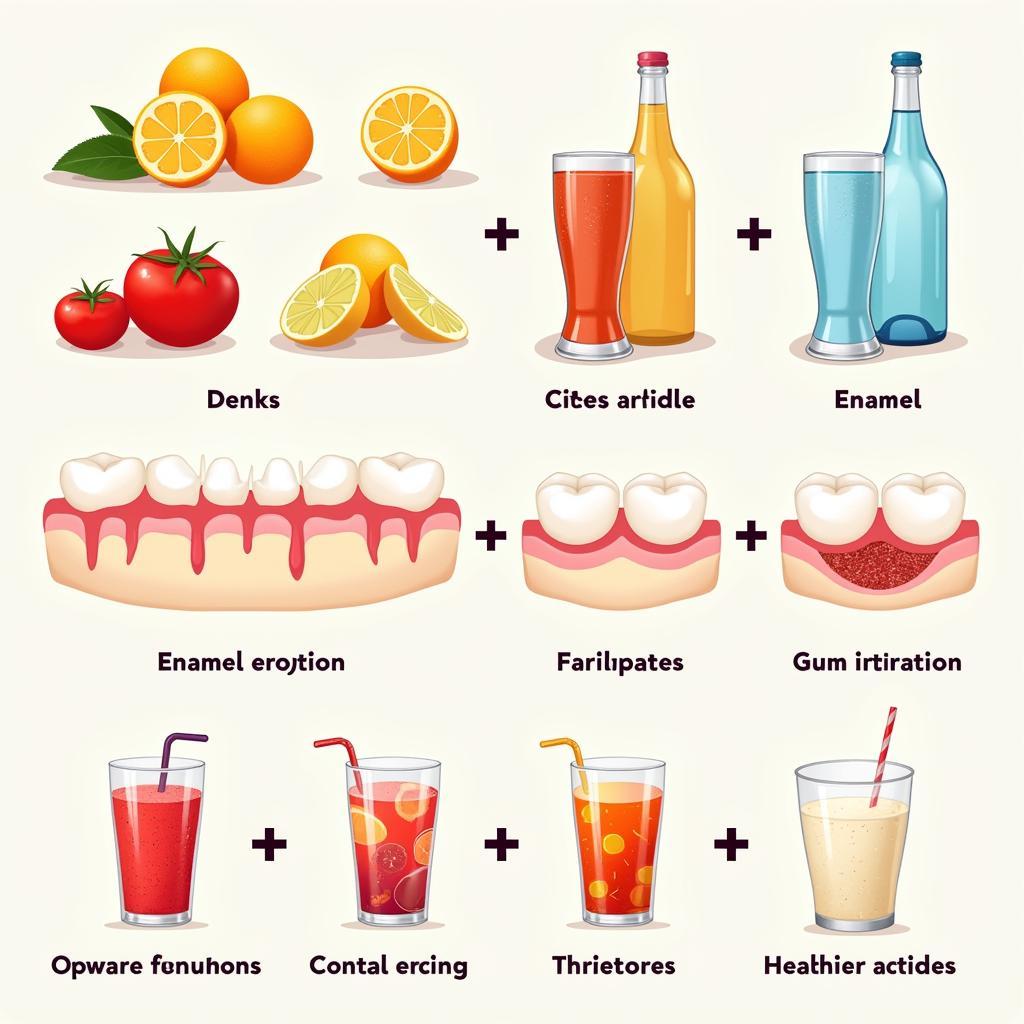Periodontal disease, also known as gum disease, can significantly impact your oral health and overall well-being. Understanding which Foods To Avoid With Periodontal Disease is crucial for managing the condition and promoting healing. Making informed dietary choices can play a vital role in preventing further damage and supporting healthy gums.
Periodontal disease is an infection of the gums that can damage the soft tissues and bones that support your teeth. Left untreated, it can lead to tooth loss and other serious health problems. While proper oral hygiene is paramount, your diet also plays a crucial role. Certain foods can exacerbate inflammation and hinder healing, while others can help protect your gums and promote oral health. So, what are the foods to avoid with periodontal disease?
Navigating Your Diet with Periodontal Disease
Choosing the right foods can make a significant difference in managing periodontal disease. Let’s delve into the specific foods to avoid and why they can be detrimental to your gum health.
Sugary Treats and Sticky Foods
Sugary foods and drinks are a breeding ground for bacteria, the primary culprit behind periodontal disease. Bacteria thrive on sugar, producing acids that attack tooth enamel and irritate gums. Sticky candies, sugary cereals, and sodas are particularly harmful as they cling to teeth, prolonging the acid attack. Cutting down on sugar is one of the most effective ways to combat periodontal disease.
Starchy and Refined Carbohydrates
Similar to sugary treats, starchy and refined carbohydrates, such as white bread, pasta, and chips, quickly break down into sugars in the mouth. These sugars fuel bacterial growth and contribute to plaque buildup, a significant factor in periodontal disease. Opting for whole-grain alternatives can help minimize this effect. If you’re struggling with receding gums, check out this helpful resource on foods to avoid with receding gums.
Acidic Foods and Drinks
Highly acidic foods and beverages can erode tooth enamel, making teeth more susceptible to decay and gum irritation. Citrus fruits, while healthy in moderation, can be problematic if consumed excessively. Similarly, carbonated drinks, even sugar-free ones, can weaken enamel due to their acidity. Limiting your intake of these acidic substances can protect your teeth and gums.
 Acidic Foods and Drinks: How They Affect Your Gum Health
Acidic Foods and Drinks: How They Affect Your Gum Health
Hard and Crunchy Foods
While crunchy foods like apples and carrots can be beneficial for oral health, excessively hard foods can be problematic for those with periodontal disease. Hard candies, popcorn kernels, and ice can chip teeth, creating rough surfaces where bacteria can easily accumulate. This can further irritate already inflamed gums. For those with sensitive teeth, consider exploring dog food for sensitive teeth as a surprising source of inspiration for softer food options.
Tobacco Products
Smoking and chewing tobacco are major risk factors for periodontal disease. Tobacco use weakens the immune system, making it harder for the body to fight infection. It also reduces blood flow to the gums, hindering healing. Quitting tobacco is crucial for improving oral health and overall well-being. Even your pets can suffer from dental issues. Check out best dog food for dental issues for more information.
Dr. Emily Carter’s Insights on Periodontal Disease and Diet
“Diet plays a significant role in both the development and management of periodontal disease. By making conscious food choices, patients can actively participate in their own healing process,” advises Dr. Emily Carter, a leading periodontist.
Conclusion
Understanding the foods to avoid with periodontal disease is essential for effectively managing this condition. By limiting your intake of sugary treats, starchy carbohydrates, acidic foods and drinks, hard and crunchy foods, and by avoiding tobacco products, you can create a more hospitable environment for healthy gums. If you’ve experienced sore gums due to food stuck between your teeth, you may find this resource helpful: sore gums food stuck between teeth. Prioritizing a balanced diet rich in fruits, vegetables, and lean protein can contribute significantly to your overall oral health and well-being. For pet owners concerned about their furry friend’s breath, this article on dog food that helps with bad breath might provide valuable insights.
FAQ
- What are the early signs of periodontal disease? Early signs can include bleeding gums, redness, and swelling.
- Can periodontal disease be reversed? While advanced stages may cause irreversible damage, early detection and treatment can help reverse some of the effects.
- How often should I visit the dentist for periodontal checkups? Regular dental checkups, typically every six months, are essential for early detection and treatment.
- Besides diet, what else can I do to prevent periodontal disease? Proper oral hygiene, including brushing and flossing regularly, is crucial.
- Is periodontal disease linked to other health problems? Research suggests a link between periodontal disease and other health conditions like heart disease and diabetes.
- Are there any specific foods I should eat to promote gum health? Foods rich in vitamins C and A, like leafy greens and berries, can support gum health.
- What is the best treatment for periodontal disease? Treatment varies depending on the severity of the condition and may include scaling and root planing, antibiotics, or surgery.
Scenarios:
Scenario 1: You notice your gums bleed when you brush your teeth. This could be an early sign of periodontal disease, so avoid sugary snacks and schedule a dental checkup.
Scenario 2: You’ve been diagnosed with periodontal disease. Focus on eliminating sugary drinks, starchy carbs, and acidic foods from your diet to support healing.
Further Reading: Consider exploring our other articles on oral health and nutrition for more valuable information and practical tips.
Need Help?
When you need support, contact Phone Number: 02437655121, Email: minacones@gmail.com or visit us at 3PGH+8R9, ĐT70A, thôn Trung, Bắc Từ Liêm, Hà Nội, Việt Nam. We have a 24/7 customer service team.